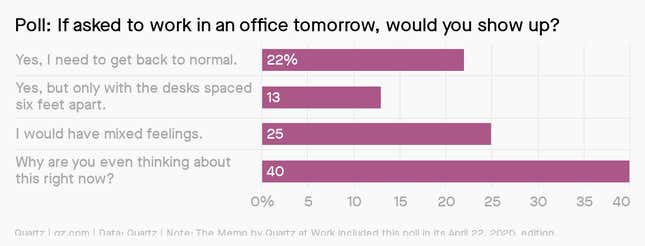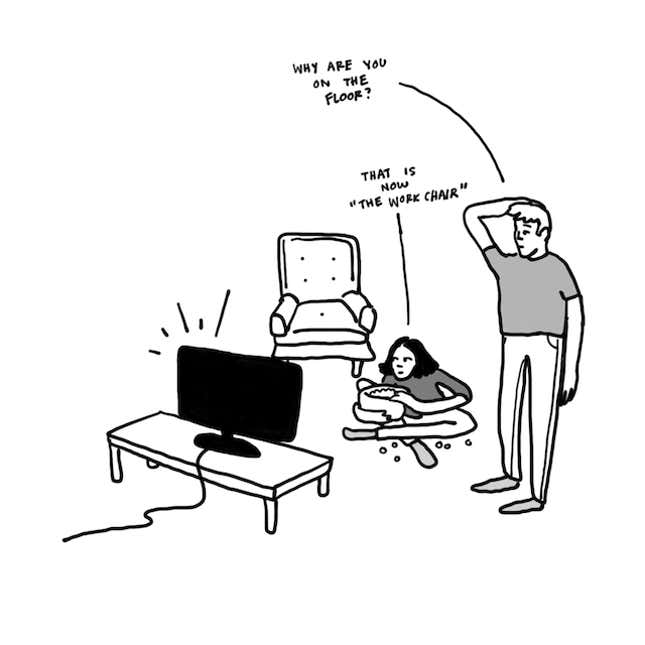To modern workers everywhere,
Healthcare professionals always would have topped any ad-hoc list of workers crucial to a functioning society. Now they’re joined by grocery store clerks, delivery drivers, and anyone who keeps a supply chain functioning.
The rest of us are probably noticing changes in how we perceive the value of labor deemed essential in a pandemic. And some of us, perhaps for the first time, are interrogating the essentialness of our own work.
Because of the financial imperative to work, few of us regularly think about why we do it or what value it brings to society. Is our work essential? Had we bothered to inquire before Covid-19, the answer very well might have been yes. Work gives us a piece of our identity, a structure for our day.
But Covid-19 has upended much of what we thought we knew about work. Many people thought working every day was inevitable. Those who have been laid off or furloughed are discovering that it’s not. Those who regularly went to an office or met around a table with clients are now doing work in ways they didn’t think possible, and in some cases weren’t possible until recent technology made them so. The newly remote are experiencing a radical collision of professional life with home and family life—a collision that, it’s been argued, could lead to the end of “professionalism” itself.
“I think this could be the great reset,” says Greg McKeown, author of New York Times bestseller Essentialism: The Disciplined Pursuit of Less. “I’ve spent years talking with people about what is essential to them, to companies like Apple, Google, Twitter; to individuals; coaching people. And I’ve never seen anything to compare with this. Almost everybody is asking this question: What’s essential now?”—Cassie Werber
+ If you’re reflecting on your work and career path or job searching in this moment, we hope you’ll join us for a video workshop on career building in quarantine this Thursday 11-12 EDT. The live event is free, and a recording will be available to Quartz members.
Five things we learned this week
Chinese businesses hit hard by the pandemic are lending out workers to other employers.
Social-distancing technology can ensure workers stay six feet apart.
College students shouldn’t expect big refunds on spring tuition.
Covid-19 is set to unleash a wave of mergers and acquisitions.
The cubicle is set for a comeback.
30-second case study
Food startups in India, like their counterparts around the globe, are grappling with heightened demand, supply issues, and staffing shortages. The challenges have prompted a range of new strategies and tactics, as Quartz India retail reporter Sangeeta Tanwar, based in New Delhi, has found.
Online meat and seafood company Licious had to switch from its signature in-house fleet to third-party solutions for delivery, and stepped up hiring to fill more gaps, Sangeeta reported. Meanwhile, iD Fresh Food went in the other direction, launching a tech solution to connect shoppers with its products and to consolidate orders. Logistics startup Delhivery is using data science to optimize delivery routes and is moving to automate warehouse operations. And e-grocer BigBasket has met rising demand with a smaller team by moving to a community sales model.
The takeaway: The pandemic has unleashed complex problems, so the answers aren’t always simple or obvious. Companies that are prepared to innovate, and to pivot quickly as needed, are probably better positioned to meet these challenges.
It’s a fact
Six weeks into widespread sheltering at home in the US and elsewhere, female academics appear to be submitting significantly fewer papers to journals—especially as solo authors—while submissions from their male counterparts are up as much as 50%. The working theory is that the women are shouldering more child-care, home-schooling, and housework responsibilities, while the men are feeling more freed up by lessened teaching loads to focus on writing.
Poll: Shifting gears
Are you considering a career pivot?
💭 Yes, it’s the perfect time to reflect and look around.
😓 I would, but I’m overwhelmed.
🛣️ I’m already on the right path. Full speed ahead!
😰 Are you kidding? That’s a luxury I can’t afford to indulge.
+ Last week’s survey results suggest that most of us have misgivings about returning to the office—only 22% of you gave an unequivocal “yes.”

Words of wisdom
“The millions of people who do…essential jobs have been excluded from the abundance of our economy and marginalized by our society. We should not continue to accept this as normal.”—Maureen Conway, VP of policy programs and executive director of the Economic Opportunities Program at the Aspen Institute
+ Read Maureen’s full article on why poorly paid workers deserve better than “normal”
For Quartz members only
How do you organize the short- and long-term tasks you want to complete? And how do you organize things like meeting notes and information from the web? In this presentation, exclusive to Quartz members, we share strategies that can increase your efficiency and give your productivity routine purpose. Members can download a PDF version or the PowerPoint file. Readers of The Memo are eligible for 40% off the first-year Quartz membership price of $99 by using the code QZFLASHSALE. Sign up for membership here.
ICYMI
Suffering from decision fatigue, yet facing a big business (or personal) decision? Try using a logic tree. It can help you visualize all the component parts of the problem so you can zero in on a hypothesis to test.

You got The Memo!
Our best wishes for a productive and creative day. Please send any workplace news, comments, career pivots, or logic trees to work@qz.com. Get the most out of Quartz by downloading our app and becoming a member. This week’s edition of The Memo was produced by Heather Landy and Holly Ojalvo.